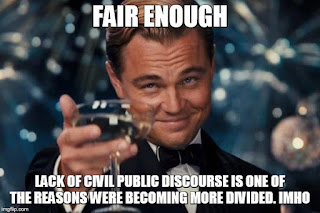The Pollution in the Pubic Square
"The most pressing environmental problem we face today is not climate change. Rather it is pollution in the public square, where a smog of adversarial rhetoric, propaganda, and polarization stifles discussion and debate, creating resistance to change and thwarting our ability to solve our creative problems." (Hoggan) When reading this, one might question, 'What exactly is the problem with propaganda?' The term has definitely gotten its bad reputation after the course of the most recent years. When referring to the most recent propaganda, we can attest that it is very much alive in the sense that the media tends to form up lies or create false advertising to fit their agenda.
It has become a lot more difficult to know the truth on what is going on in the recent news we see. There is also a big influence when it comes to social media. There is a lot of misuse when it comes to social media by different political parties as they tend to spread misinformation to help support their side. At this point in time, it is the wisest thing to not believe everything you are told without providing evidence or sources that support the points they are making.
In the chapters for this week, Hoggan talks about how he has been immersed in the challenges of "how we create the space for higher-quality public debates where passionate opposition and science shape constructive, mind-changing conversations." In the end, all we want is the truth. Propaganda results in no important change on the reader’s ideals or morals, like the coverage of a popular new restaurant. The topic does not have much effect because it is not powerful enough to significantly change a society. The light heartedness of the topic blinds a person to the fact that they are still reading a source of propaganda making people not realize how common propaganda truly is.
In the end, propaganda has caused a lot of issues as it can spread a lot of false information. However, it does tell us about the current social issues that are occuring. In order for us to really find out the truth, we need to do our own research and find the real evidence to back up the information that is given to us. The message written is that we need to be more aware of the information we receive and to not believe everything we are told. We need to be more mindful as we don’t want to spread misinformation even further.


Is propaganda seen in a similar light to advertising then? We are plagued by advertisements wherever we go. Whether it is billboards, posters, or even music in a grocery store, advertisements are constantly hounding us, controlling our thoughts without us even knowing it. Personally, I think propaganda could be better than advertising. I say this timidly, because propaganda could mean different things for different people. I think the idea of propaganda and advertisements can be very similar in certain situations. However, I think propaganda has a much better chance of being used for a "positive" than advertisements. Although propaganda could be misinforming a crowd, I find that most propaganda is used to encourage an action, which could be vital in encouraging actions against climate change and so on. I honestly think propaganda could be considered a more positive form of advertising.
ReplyDeleteI like how you started your post with Hoggan's public square pollution quote. Each time I happen to turn on a news channel, read an article, or see a Twitter post, people tend to portray information that is one-sided. People point out bits of information that prove their viewpoint is “correct” and the opposing side is not. Through displaying only one viewpoint, whether that be on social media or a news station, viewers may interpret the situation incorrectly. Also, by people displaying one side of an argument, people that support the opposing side will unlikely change their viewpoint. In fact, the opposing side may hold their ground even more. Various forms of media sometimes exaggerate or create false information to heighten a situation and/or viewpoint. By providing this type of information, people will become misinformed and perhaps persuaded by false information.
ReplyDelete